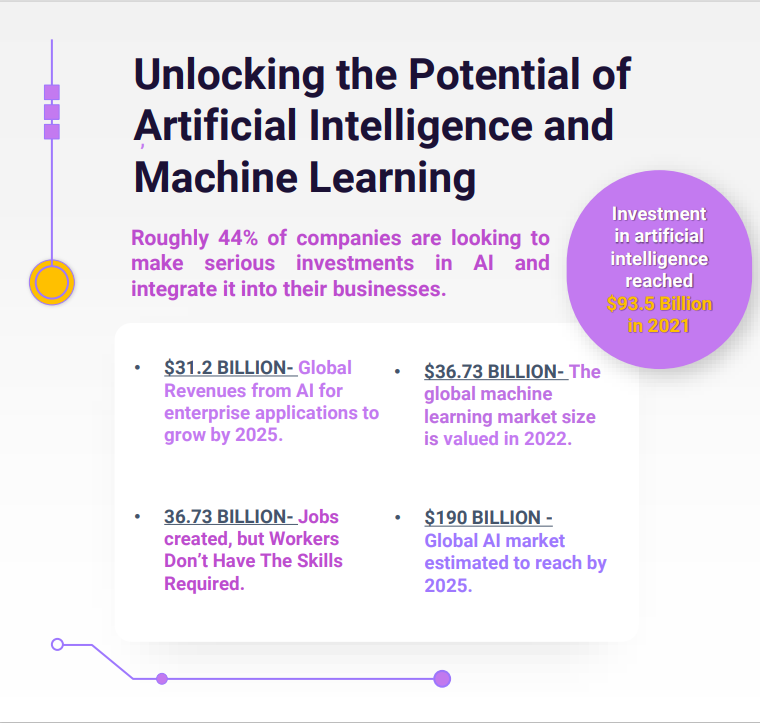
Artificial Intelligence (AI) - Be Future Ready
The Rise of Artificial Intelligence: Transforming the Modern World
Artificial Intelligence (AI) has rapidly evolved from a niche area of computer science into a transformative force reshaping industries, societies, and our daily lives. With its roots in the mid-20th century, AI has matured through decades of research, innovation, and practical applications, becoming one of the most influential technologies of the 21st century.
Artificial Intelligence (AI) has rapidly evolved from a niche area of computer science into a transformative force reshaping industries, societies, and our daily lives. With its roots in the mid-20th century, AI has matured through decades of research, innovation, and practical applications, becoming one of the most influential technologies of the 21st century.
Today AI has transformed our lives in many ways, making our life simpler and easy. Recent news as all we are aware about Tesla Self Driven Cars and New Launch of Roboto Optimus all are AI backed. The furture has a immense scope for those who are skilled and expert in AI technologies.
What is Artificial Intelligence?
AI refers to the simulation of human intelligence in machines designed to perform tasks that typically require human cognition. These tasks include learning, reasoning, problem-solving, perception, and language understanding. AI systems are powered by algorithms and data, enabling them to identify patterns, make predictions, and adapt over time.
AI refers to the simulation of human intelligence in machines designed to perform tasks that typically require human cognition. These tasks include learning, reasoning, problem-solving, perception, and language understanding. AI systems are powered by algorithms and data, enabling them to identify patterns, make predictions, and adapt over time.
How AI continues to develop in the next 10 years
Between now and 2034, AI will become a fixture in many aspects of our personal and business lives. Generative AI models such as GPT-4 have shown immense promise in the short time they've been available for public consumption, but their limitations have also become well known. As a result, the future of AI is being defined by a shift toward both open source large-scale models for experimentation and the development of smaller, more efficient models to spur ease of use and facilitate a lower cost.
Between now and 2034, AI will become a fixture in many aspects of our personal and business lives. Generative AI models such as GPT-4 have shown immense promise in the short time they've been available for public consumption, but their limitations have also become well known. As a result, the future of AI is being defined by a shift toward both open source large-scale models for experimentation and the development of smaller, more efficient models to spur ease of use and facilitate a lower cost.
Initiatives such as Llama 3.1, an open source AI model with 400 billion parameters and Mistral Large 2, released for research purposes, illustrate the trend of fostering community collaboration in AI projects while maintaining commercial rights. The growing interest in smaller models has led to the creation of models such as the 11 billion parameter mini GPT 4o-mini, which is fast and cost-effective. It won't be long before there's a model suitable for embedding in devices such as smartphones, especially as the cost continues to decrease.
This movement reflects a transition from exclusively large, closed models to more accessible and versatile AI solutions. While smaller models offer affordability and efficiency, there remains a public demand for more powerful AI systems, indicating there will likely be a balanced approach in AI development to attempt to prioritize both scalability and accessibility. These new models deliver greater precision with fewer resources, making them ideal for enterprises needing bespoke content creation or complex problem-solving capabilities.
AI has influenced the development of several core technologies. AI plays a pivotal role in advancing computer vision by enabling more accurate image and video analysis, which is essential for technologies such as autonomous vehicles and medical diagnostics. In natural language processing (NLP), AI enhances the ability of machines to comprehend and generate human language, improving communication interfaces and enabling more sophisticated translation and sentiment analysis tools.
AI supercharges predictive and big data analytics by processing and interpreting vast amounts of data to forecast trends and inform decisions. In robotics, the development of more autonomous and adaptable machines simplifies tasks such as assembly, exploration and service delivery. Also, AI-driven innovations on the Internet of Things (IoT) enhance the connectivity and intelligence of devices, leading to smarter homes, cities and industrial systems.



